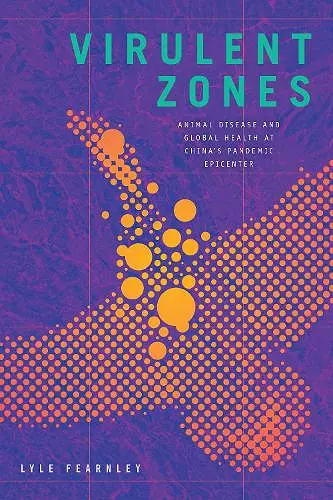Virulent Zones
Animal Disease and Global Health at China's Pandemic Epicenter
Format:Paperback
Publisher:Duke University Press
Published:23rd Oct '20
Should be back in stock very soon
This paperback is available in another edition too:
- Hardback£82.00(9781478009993)

Scientists have identified southern China as a likely epicenter for viral pandemics, a place where new viruses emerge out of intensively farmed landscapes and human--animal interactions. In Virulent Zones, Lyle Fearnley documents the global plans to stop the next influenza pandemic at its source, accompanying virologists and veterinarians as they track lethal viruses to China's largest freshwater lake, Poyang Lake. Revealing how scientific research and expert agency operate outside the laboratory, he shows that the search for origins is less a linear process of discovery than a constant displacement toward new questions about cause and context. As scientists strive to understand the environments from which the influenza virus emerges, the unexpected scale of duck farming systems and unusual practices such as breeding wild geese unsettle research objects, push scientific inquiry in new directions, and throw expert authority into question. Drawing on fieldwork with global health scientists, state-employed veterinarians, and poultry farmers in Beijing and at Poyang Lake, Fearnley situates the production of ecological facts about disease emergence inside the shifting cultural landscapes of agrarian change and the geopolitics of global health.
“Readers will come away with a newly visceral understanding of the phrase One Health, as they journey with scientists and epidemiologists through the bodies and ecologies of animal viruses in China. This is a book that rearranges one's sense of scale and time, with a slow and massive build to the sharpness of crisis and the paradoxical enormous scale of the microscopic at play in every scene.” - Hannah Landecker, Professor of Sociology, University of California, Los Angeles “Virulent Zones tells an intricate story about ways the sciences interlace with geopolitics, with profound impacts on public health at many scales. Lyle Fearnley also provides new perspective on how the sciences advance, both geographically and conceptually, through displacement rather than discovery. This important book will be of critical interest to anthropologists and historians of science, scientists, and those working to build transnational scientific and governance capacity.” - Kim Fortun, author of (Advocacy after Bhopal: Environmentalism, Disaster, New Global Orders) “Lyle Fearnley’s Virulent Zones offers a gripping anthropological account of the search for the origins of influenza pandemics in China…. Virulent Zones is an outstanding scholarly work as it unmasks the mechanism of virus hunting and disease control in China at a time of marketization and globalization. It allows for an alternative understanding of the interplay of science and everyday life. It is highly recommended reading not only for anthropologists but also for anyone interested in public health in contemporary China.” - Qiliang He (East Asian Science, Technology and Society) "[A] compelling argument for the move away from older microevolutionary theories of pathogenesis, based on competition of hosts and parasites, toward a more systemic and rigorous reckoning-a dynamic configuration-of how environments and animal populations (human and nonhuman) connect up to promote viral innovation. . . . We can read [it] with profit to learn more about our current predicament, to see how historical perceptions and responses are repeated or modified as we come to terms with the pandemic that confronts us today." - Warwick Anderson (Public Books) “Virulent Zones reads like a detective novel uncanny in its timeliness to collective conditions today, as it follows the travails of scientists across continents, trying to locate the origins of viral pandemics.” - Emily Ng (Somatosphere) “Virulent Zones would make an excellent addition to any course covering topics in global health, medical anthropology, the production of scientific knowledge, networks, and expertise, or the history of medicine and public health.... Those who want to know more about pandemic planning and viral surveillance in the wake of COVID-19 will also find this an invaluable resource.” - Theresa MacPhail (Medical Anthropology Quarterly) “Virulent Zones shows how science and geopolitics intersect and how this has an important impact on global health. As such, it is a key text for medical anthropologists and sociologists, historians of science, STS researchers, and those working in global health.” - Giulia De Togni (New Genetics and Society) “Lyle Fearnley’s Virulent Zones . . . is a timely and reflexive ethnographic account of global focus on China as the ‘epicenter’ of new zoonotic diseases. . . . This book kicks off an important and enthusiastic discussion about global health and China.” - Shao-hua Liu (Journal of Anthropological Research) “Virulent Zones is an impressively timely book. . . . [Some remaining] questions indicate the rich potential of the ideas articulated so lucidly by Fearnley in this excellent book.” - Mary Augusta Brazelton (Journal of Asian Studies) “Virulent Zones is an excellent, informative book that serves as a welcome and valuable addition to the growing literature on the anthropology of epidemics. . . . It also serves as an important contribution to the anthropology of science, human-animal interactions, the environment, agriculture, and China.” - Katherine A. Mason (Anthropological Quarterly) “[Fearnley’s] analysis goes beyond a classic medical anthropology approach; he navigates between different areas and topics of social studies (sciences, expertise, international relations, rurality, etc.) to forge alliances between different fields of knowledge, and to work across the classic divisions. This is crucial to address the complexity of emerging diseases.” - Muriel Figuié (Review Of Agriculatural Food And Environmental Studies)
ISBN: 9781478011057
Dimensions: unknown
Weight: 408g
288 pages